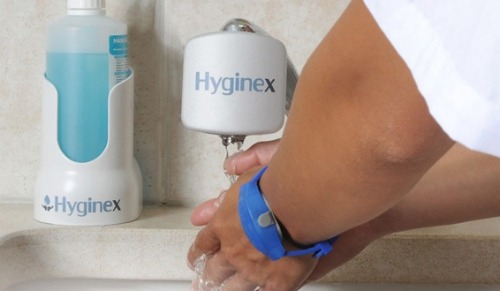
It’s one of healthcare’s biggest ironies: going to a hospital for life-saving treatment can actually cost you your life. More than one million people in America each year get sick from infections they contract in hospitals, resulting in about 100,000 deaths. Fighting these infections costs the healthcare system about $30 billion every year.
The main reason, says Efrat Raichman, is poor hand hygiene of the hospital staff.
In response, Raichman has developed Hyginex, a new high-tech system to keep hospital workers’ hands clean. If everyone from nurses and doctors to orderlies and candy-stripers — even food handlers in the cafeteria — are required to use it, hospital administrators can help ensure the highest sanitary standards.
At its core, Hyginex is an online software solution that communicates with a bracelet resembling a sports watch. Worn by every shift worker, the bracelet is equipped with gyroscopes and other movement sensors and emits a gentle red LED light to remind personnel to wash their hands between patients — or however frequently the system is programmed to provide alerts.
Hyginex aims to improve hand-washing compliance and quality without requiring any special training.
Measures quantity and quality
“Today the hand hygiene in hospitals is so poor, that when I talk to [the managers] they report that the staff is just doing it about 20 percent of the time it is required,” says Raichman, the founder and CEO of the company. “They say even a 50% compliance would be great. The system can be programmed to meet any requirement.”
Raichman tells ISRAEL21c that other products with the same goal are on the market. “But we have a patent and they can’t match us. Ours is the only system that can test the compliance of the staff and also test the quality of the hand washing. Simply opening the tap doesn’t mean you’ve washed your hands, or if you stand near the hand sanitizer, that they are sanitized,” she claims.
The Hyginex system incorporates sensors on the bracelet, in the dispensers and in the tap to measure the duration of vigorous hand washing, and then transfers that information to a computer.
“With this information, we can understand the status of the worker so the department head or staff can be alerted to any problems,” she says.
In the future, the bracelet will be equipped with an optional watch that can be programmed for other functions including security — so that staff might be able to open or close doors using the bracelet as a remote control device. But Raichman’s primary goal is cleaner hands to save lives.

This passion came out of a personal tragedy: Her uncle died from a hospital-contracted infection. “It’s scary. I am afraid to go to the hospital,” says Raichman, who has a degree in electronics and computer science from the Holon Academic Institute of Technology in Israel. She brings a lot of R&D experience to the table, having worked at a number of startups and co-founded, with her husband, a successful toy business called Indot.
Online reports to manager’s desk
Hyginex was founded in 2008 and is based in Tel Aviv, funded by private investors from Europe and Israel.
The staff of five is already seeing sales in several Israeli hospitals, including one of the country’s largest, Rambam Health Care Campus in Haifa, which has 3,000 employees.
The cost is less than $100 per month per bracelet. That includes installation of the system on water taps, plus maintenance and performance reports that go to management. The reports detail how well the hospital is performing hand washing overall; they can even single out specific personnel who need better encouragement.
Raichman says the cost savings for hospitals is potentially much greater that the outlay for the system. Using Hyginex could save the institution money on antibiotics and on the amount of days patients must be hospitalized due to hospital-acquired infections. Insurance companies may not cover illnesses picked up in the hospital.
The company is now starting to market the system to US hospitals.












